In my younger days, the old people didn’t fear the dark, or at least that’s what they said. “Don’t be afraid of the dark,” they’d tell me as if it was something I could just do. Washing my hands before eating, putting my dirty clothes in the hamper, lifting the toilet seat, closing the toilet seat, and saying “thank you” when someone did something nice were things I could just do. Being unafraid of the dark was not.
Even though I’m one of the old people now, I still have irrational feelings about the dark. I suppose I’m afraid that a bear, a wolf, a mountain lion, or some other large carnivore will spring from the darkness and eat me. Or maybe it’ll be a serial killer. Or a Bigfoot. Fearing these things is rational because they could happen. What is irrational is being unafraid of the dark when someone is with me. A grizzly in Alaska ate both Timothy Treadwell and his girlfriend. A cougar in Seattle mauled two people who were biking together. And the job description for a serial killer is literally killing more than one person. But despite this compelling evidence, I’m not afraid of the dark when I’m with another person, especially when they are slower than me.
When I’m alone, though, I’m pretty sure the song of a whippoorwill is a signal from one meth addict to another. “Whip-poor-will, whip-poor-will” actually means, “Now is the time to rush the fisherman, hit him over the head with a tire iron, take his gear and sell it for cash to buy antifreeze, white gas, and acetone.” Because my mind works this way, I should avoid being alone in the dark. But I can’t—I’m a dry-fly fisherman in Michigan.
Sure, some of Michigan’s mayflies are exhibitionists. But many are timid and prefer to have sex with the lights off. They dance, mate, and fall to the water in the darkest of the night, which, as John Voelker explained, “is frequently the last ride, for it is here that the fat tribal chieftains among the brown trout foregather at dusk to roll and cavort.” So if I want to be there for the tribal chieftains rolling and romping, I too need to foregather at dusk with a stout heart and reliable light.
The brown drakes aren’t always so shy. They don’t mind if a bit of light comes in through the curtains. I can catch a few fish and return to my truck before it gets too dark. I can also go deep into the darkness if I’d like, but I often don’t need to. It’s those damn Hexagenia Limbatas—the titans of winged biomass—who insist on drawing the shades, closing the doors, and pulling every nightlight from its socket before making whoopee. And while I wait for their mood to strike, I sit on a log in a deep darkness that commands the few remaining hairs on my head to stand at attention.
More Like This
No matter how often I’ve done it, I’m never ready for the startling sound of that first cavorting fish. I suppose I could practice by sitting beside a pond at night while some kid throws bricks into the water at random times. But many people might not understand why a grown man is paying a kid to go to a pond with him at night. And for me, anyway—after its startling introduction—that first fish temporarily suspends all of my fear. I’ve never heard of anyone being eaten by a bear or tire-ironed by a meth addict while actively casting to a rising trout. This is the sort of thing that only happens when you’re sitting on a log waiting for that first fish or walking back to your car.
A few summers ago, I drove seven hours from my home in Michigan’s Upper Peninsula to a place below the Mackinac Bridge that people in our state call Northern Michigan. It’s odd to drive south to get to the north, but if Rhode Island can be on the mainland of the United States, then I suppose Northern Michigan can be in the middle of the state. It was June, and June in Northern Michigan meant I’d be fishing in the dark.
The night I left home, I stopped at a cabin on a local river—a place a friend lets me use in return for occasionally cutting the grass. It’s the only cabin on a remote stretch of the river, and the “road” to it begins with an easement through a farm and then continues for a couple of miles on a barely recognizable two-track trail. Outside of a week during deer season, the cabin sits alone.
Partly to develop my nighttime nerve for the rest of the trip, I fished into the darkness, landing a plump rainbow that—with some coaxing—mistook a size 16 Roberts’ Yellow Drake for whatever it was eating. Afterward, I retired to the cabin for a sandwich and a beer. After spreading my sleeping bag on the bed, I thought about leaving the cabin door open to listen to the river, but I bolted it tight instead. If a bear or serial killer wanted to get me tonight, they’d at least have to break down the door or shatter a window.
At about 2 a.m., I awoke to the sound of someone pacing on the cabin’s front porch. I thought I had imagined it in a dream, so I closed my eyes and wished myself back to sleep. But then I heard it again. At first, it was the squeak of a loose plank, then the dull—but recognizable—sound of a footstep. After all these years of worry, it was finally happening. Someone, or something, was going to kill me in the darkness.
“You should carry a gun if you’re going to spend a lot of time out in the woods,” a friend once told me, and now I wished I had, if for no other reason than to shout, “Hey, I have a gun in here.” Instead, I stayed quiet and hoped whoever—or whatever—was out there would think the cabin was empty. But any person could see that my truck was next to the porch, and any competent man-eating animal could smell my fear. I was Davey Crockett, and this was my Alamo.
My phone didn’t have the bars or the charge to make a call or send a text. But—even if it did—a call for help would have been pointless. By the time anyone arrived, I’d be tomorrow’s headline. Instead, if the phone had worked, I’d have sent a quick text to my wife telling her I loved her and that she should put something like “I knew I should have been more afraid of the dark” on my tombstone.
My assailant’s next move was to knock on the door. Who the hell knocks on the door before attacking you? Did they really think I’d come to the door and open it? Their next knock sounded more like a scratch, most likely caused by a Bigfoot’s untrimmed nails. Then I heard them chew on the outside of the cabin. My bogeyman was gnawing through the wall.
I was wide awake now, and the part of my brain that wasn’t preoccupied with the fight-or-flight dilemma remembered that porcupines had been eating the siding on the cabin. It’s a kind of rustic plywood that porcupines love to eat for the glue between plies. So I went to the door, smacked the inside, and yelled, “Get out of here, porcupine!” The critter stopped gnawing and shuffled off the porch. When I got back in bed, the chomping started again on the side of the cabin outside another bedroom. So I banged on that wall and wailed, “Get the hell out of here!” The porcupine moved to another part of the cabin, and our Abbott and Costello routine went on for nearly an hour. Finally, I grabbed a flashlight and stepped outside to confront my nemesis.
I knew porcupines were slow, but I didn’t know they could slowly shimmy up the corner of a cabin like this one did. Its chubby body came to rest on a beam that extended from the cabin wall to the roof. Being about six feet from this porcupine allowed me to learn something else I didn’t know about them. Eating things like plywood siding turns their teeth the color of a pumpkin.
“It is little wonder people have so frequently been bamboozled into believing tales of porcupines shooting their quills with arrowlike accuracy,” Jerry Dennis wrote in A Walk in the Animal Kingdom. Although I’m among the easily bamboozled, I was pretty sure the porcupine couldn’t shoot its quills, but I suspected that six feet would be beyond its range if it did. So I found a six-foot stick to deliver my eviction notice—a couple of solid smacks on the beam on which the porcupine clung.
I returned to the cabin, giving the porcupine space to gather its remaining pride and leave. But when I got back into my sleeping bag, the gnawing restarted. I retrieved my stick and decided that shooting quills and sharp orange teeth be damned, this porcupine was coming off the post. I lined the rodent up at the end of my stick like a giant billiard ball covered in quills. Then I shot the brute toward the corner pocket. After he thumped to the ground, I yelled and pretended to give chase as the defeated quill pig waddled off into the woods.
Back in the cabin, I flashed the light through every room to ensure no person or thing had snuck in during the fray. Then I drank a couple of thimbles of bourbon to dull the edges my battle with the great beast had honed. A little past 3 a.m., I climbed back into my sleeping bag and closed my eyes. At 4 a.m., I awoke to footsteps on the cabin’s roof. I drew the sleeping bag tight over my head and told myself, “Don’t be afraid of the dark,” as though it was something I could just do.




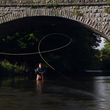
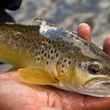





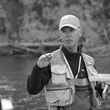




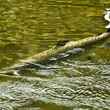








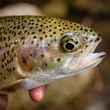
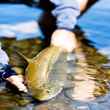

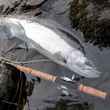

Comments
Robert teeden replied on Permalink
Just to let you know we Rhode Islanders also have a prolific Hexagenia hatch also
And just for lack of geographical knowledge Rhode Island is not an Island and we have some of the best Salt and fresh water fly fishing in the country
Michael yero replied on Permalink
Fantastic stuff Tim. I thoroughly enjoyed that and will look forward to your next post.
Pages